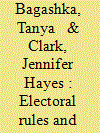| Srl | Item |
| 1 |
ID:
148654


|
|
|
|
|
| Summary/Abstract |
We argue that state legislative politics is qualitatively different from national congressional politics in the extent to which it focuses on localized and geographically specific legislation salient to subconstituencies within a legislative district. Whereas congressional politics focuses on casework benefits for individual constituents, state legislative politics is more oriented to the delivery of localized benefits for groups of citizens in specific areas within a district, fostering a geographically specific group connection. A primary way to build such targeted geographical support is for members to introduce particularistic legislation designed to aid their specific targeted geographical area within the district. We argue that this is primarily a function of electoral rules. Using original sponsorship data from U.S. state houses, we demonstrate that greater district magnitude and more inclusive selection procedures such as open primaries are associated with more particularism. Our findings provide strong support for a voter-group alignment model of electoral politics distinct from the personal vote/electoral connection model that characterizes U.S. congressional politics and is more akin to patterns of geographically specific group-oriented electoral politics found in Europe and throughout the world.
|
|
|
|
|
|
|
|
|
|
|
|
|
|
|
|
| 2 |
ID:
185026


|
|
|
|
|
| Summary/Abstract |
A classic question about democratic elections is how much they are able to influence politician behavior by forcing them to anticipate future reelection attempts, especially in contexts where voters are not paying close attention and are not well informed. We compile a new dataset containing roughly 780,000 bills, combined with more than 16 million roll-call voting records for roughly 6,000 legislators serving in U.S. state legislatures with term limits. Using an individual-level difference-in-differences design, we find that legislators who can no longer seek reelection sponsor fewer bills, are less productive on committees, and are absent for more floor votes, on average. Building a new dataset of roll-call votes and interest-group ratings, we find little evidence that legislators who cannot run for reelection systematically shift their ideological platforms. In sum, elections appear to influence how legislators allocate their effort in important ways even in low-salience environments but may have less influence on ideological positioning.
|
|
|
|
|
|
|
|
|
|
|
|
|
|
|
|